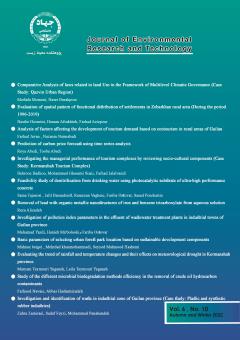Investigating the managerial performance of tourism complexes by reviewing socio-cultural components (Case study: Kermanshah Tourism Complex)
Subject Areas : اقتصاد محیط زیست
Behroz Badko
1
,
Mohammad Ghasemi Siani
2
![]() ,
Farhad Jalalvandi
3
,
Farhad Jalalvandi
3
1 -
2 - پژوهشگاه علوم انسانی و مطالعات اجتماعی
3 -
Keywords: ural, social, tourism management, tourism management performance, Kermanshah,
Abstract :
Today, tourism is one of the largest industries in the world and depends on a major part of the global economy; Tourism is economically, socio-culturally and environmentally integrated with the lives of people and governments. The purpose of this study is to investigate the managerial performance of tourism complexes and present a strategic proposal with emphasis on socio-cultural components in Kermanshah tourism complex. This article examines the managerial performance in four tourism complexes, Rakhsh, Nesar, Nodsheh and Sefid Barg in Kermanshah province. And how can focusing on these components provide successful and appropriate management for the Kermanshah Jihad University tourism complex? This research was conducted using field survey and questionnaire tools presented to 152 people in Kermanshah tourism managers. The results showed that the components of reviving cultural identity and sense of national pride, promoting the culture of tourist reception and retention are ranked first, second and third among all the identified components affecting the managerial performance of tourism complexes, respectively. Accordingly, the emphasis on cultural identity and the necessary training to the managers of the complexes to create a culture of tourist reception has a significant impact on attracting tourists to the tourist complexes of the province.
• اردکانی، سعید، (1382)، شناسایی و اولویتبندی مؤلفههای مؤثر بر سطح رضایت گردشگران خارجی در شیراز با استفاده از تکنیک های تحلیل عاملی و تصمیم گیری چند شاخصه، فصلنامه مطالعات گردشگری، شماره 1، صص 55-50.
• اژدری، علیرضا، (1379)، نقش مدیریت در توسعه صنعت گردشگری، نشریه انلاین علم گردشگری، به نشانی پایگاه www.tourismscience.ir
• ایروانی، محمدرضا، مجیدی پرست، سجاد، (1398)، بررسی توسعه پایدار اجتماعی- فرهنگی گردشگری با رویکرد سرمایه اجتماعی، اولین همایش بینالمللی علمی – راهبردی توسعه گردشگری جمهوری اسلامی ایران، چالش¬ها و چشم اندازها.
• باقری، ابراهیم، ملکی مین باش رزگاه، مرتضی، فیض، داوود، زارعی، عظیم، (1398)، طراحی مدل مدیریت گردشگری قومی در ایران، برنامهریزی و توسعه گردشگری، دوره 8، شماره 2، صص 253-233.
• باقریان کاسگری، باقر و برزگرسلوکلائی، حوریه، (1400)، بررسی مدیریت کسب و کار توریسم در استان اصفهان، چهارمین همایش بینالمللی دانش و فناوری هزاره سوم اقتصاد ، مدیریت و حسابداری ایران،تهران
• بهرامیان، محمد، شمسالدینی، علی. (1397). تحلیلی کمی بر نقش مدیریت شهری در ارتقای صنت گردشگری در شهرها (مورد پژوهی: شهر مرودشت). پژوهش و برنامهریزی شهری, 9(32 ), 131
• حسینی، سارا، و ویسی، راحله. (1392). نقش مدیریت شهری در توسعه پایدار گردشگری شهرهای ساحلی در سالهای 1368 1388 (مطالعه موردی: شهر نوشهر). پژوهش های بوم شناسی شهری, 4(2 (پیاپی 8)), 113-124.
• خروتی، ملیحه و امین بیدختی، علی اکبر، (1394)، نقش مدیریت در صنعت گردشگری ایران، اولین همایش ملی پژوهش های کاربردی حسابداری،مدیریت اقتصاد ، دامغان
• سلطانی پاکدل، سحر، اسمعیلی سنگری، حسین، (1396)، تأثیر مؤلفههای فرهنگی در معماری فضاهای شهری با هدف ارتقاء گردشگری، کنفرانس ملی پژوهش های کاربردی درعمران،معماری و شهرسازی.
• شورای جهانی سفر و گردشگری، (1394)، برنامه ریزی توریسم در سطح ملی و منطقهای، ترجمه بهرام رنجبریان و محمد زاهدی، انتشارات جهاددانشگاهی واحد اصفهان
• عباسی، دیاکو، (1389)، الگویی مناسب به منظور مدیریت استراتژیک مقاصد گردشگری براساس مدلهای موجود (مورد مطالعه شهرستان خرمآباد)، پایاننامه کارشناسی ارشد دانشگاه علامه طباطبائی، دانشکده مدیریت و حسابداری
• کاظمی، مهدی، (1385)، گردشگری، محیط و چالشهای توسعه گردشگری پایدار برای کشورهای درحالتوسعه، فصلنامه علوم مدیریت ایران، شماره 1، صص 118-89 ، پاییز.
• هدایی، هوشنگ (1377)، بررسی جاذبههای جهانگری شهرستان کرمانشاه، استاد راهنما، صلاح الدین محلاتی، پایان نامه کارشناسی ارشد، دانشگاه شهید بهشتی، تهران
• Alkoon, N, Shioji Y. elsavan. H. (2021) Shuzo Ishimori: a pioneer of tourism studies in Japan. Anatolia 31(1):159–166.
• Butlher, G., (1980). The Economic Impact of Tourism on Christchurchcity and Akaroa Township. Journal of Economic Dynamics and Control, 11:211-200
• Leitral, C.(2012). “A determination of destination,competitiveness for Taiwan's hot springs tourism sector using the Delphi technique”. Journal of Vacation Marketing, 15, 243-257.
• Matisoun, Miriam, Yasuo Ohe val (1982), Tourism Management in Japan and Switzerland: Is Japan Leapfrogging Traditional DMO’s Models? A Research Agenda, Information and Communication Technologies in Tourism 2021 pp 389-402
• McKercher, B., Lau, g. (2008). Movement Patterns Of tourists within a destination. Tourism Geographies, 10(3), 355-374
• Russen, M., Dawson, M. & Madera, J. (2021). Gender diversity in hospitality and tourism top management teams: A systematic review of the last 10 years, International Journal of Hospitality Management, 95.
• Song, H., & Lin, S. (2010).Impacts of the Financial and Economic Crisis on Tourism in Asia. Journal of Travel Research, 49(1), 16–30.
• Sotomayor, S. (2020). Long-term benefits of field trip participation: Young tourism management professionals share their stories, Journal of Hospitality, Leisure, Sport & Tourism Education.


